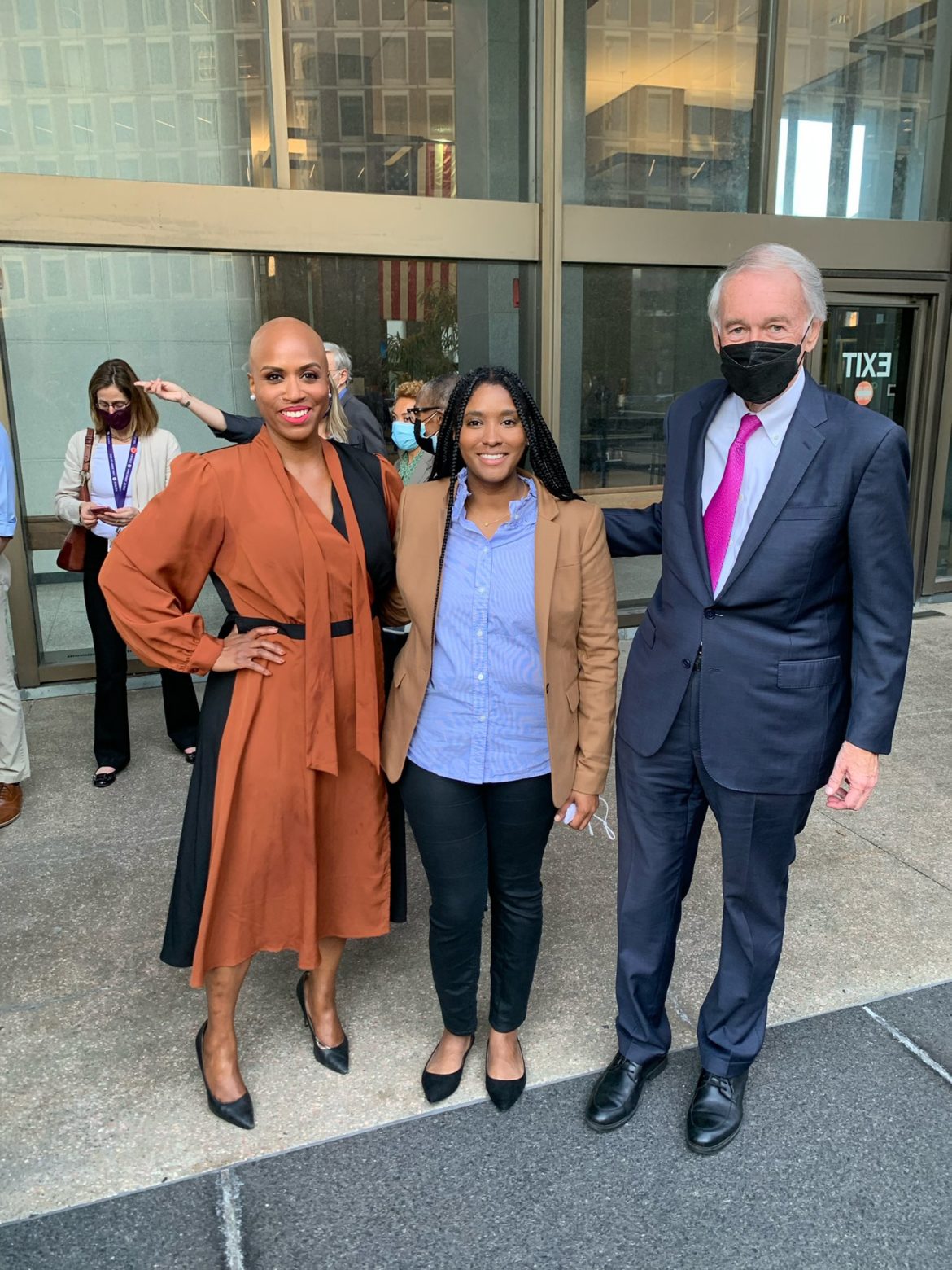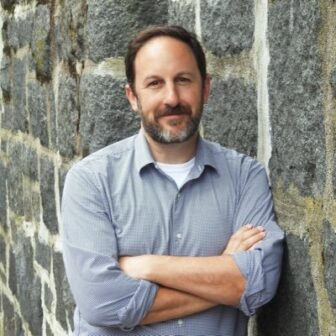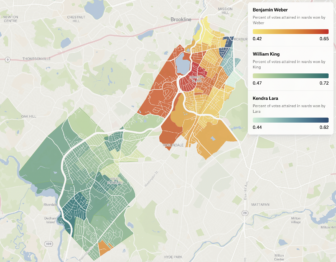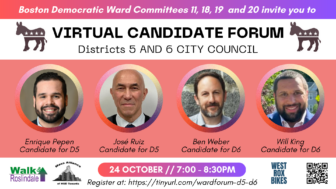Last updated on October 24, 2021
Boston City Council District 6 candidate Kendra Hicks fielded questions from Jamaica Plain News about housing, Boston Public Schools, police, and more.

The following interview was conducted electronically.
Q: You shot out of the gate after announcing your candidacy like very few candidates in recent years. How long have you been preparing to run for District 6?
Hicks: I have been a community organizer since I was 15 and, for the past six years, have committed myself to supporting nonprofit organizations in shifting their structures to be more equitable. I had not planned on running for the city council, but the social uprisings in the wake of George Floyd’s murder, including here in D6, made it clear that our residents demanded strong leadership. As a result, residents were actively, publicly searching for someone to run that would be that bold leader. After much deliberation with family, folks in the district, and people familiar with electoral politics over the summer, I decided that my experience and willingness to stand up to the status quo made me well positioned to challenge a 10-year sitting incumbent and D6 was ready.
Q: You quickly gained a lot of supporters with a strong presence on social media. Why do you think your campaign attracted supporters?
Hicks: People in this district and across Boston, the state, and nationwide are struggling. They are demanding that elected officials work to address the very real challenges working people face every day. I believe my experience and my deep roots in organizing across the district meant that people understood early what my candidacy meant and that I would champion the needs of our most marginalized residents. If elected, I would also be the first Black woman ever to represent this district and one of the few renters on the council. Ultimately, people saw themselves and their experiences in me, and they’re ready to be represented.
Q: Are you a registered member of any political party? If so, which party and why? If not, why are you not a member of a political party?
Hicks: I am a registered Democrat because it is the party that most aligns with my values of prioritizing people over profit, deepening the democratic process, and making sure that government works for all of us. In addition, the Democratic Party, with all its challenges, has historically provided a vehicle to move forward progressive policies in the country and right here in Boston. I’m proud of the work the progressive caucus has been able to do to move the Democratic Party to the left. I am excited about being a part of the progressive movement in Massachusetts and building the progressive voting block on the city council.
https://twitter.com/hicks4district6/status/1449835681816137733
Q: The current District 6 City Councilor chose environmentalism as his biggest focus/calling card. What would be your biggest focus/calling card if elected?
Hicks: I think the environmental justice work done by outgoing councilor O’Malley has had a significant impact on making the city greener. I have every intention of continuing and building on that legacy and working towards a municipal Green New Deal with the support of the Boston chapter of the Sunrise Movement, the Massachusetts Sierra Club, and Senator Ed Markey, who have all endorsed our campaign.
Together, with dozens of people from across the district, we created a 36 point policy platform, the Six for D6. Because of the intersectional nature of all issues, it is hard to prioritize. Still, I have said that of those six, the three most pressing issues for our district are Affordable Housing, Education, and Environmental Justice.

Q: Your current job is director of radical philanthropy for Resist. What does your job entail? How would that experience help you as a city councilor?
Hicks: My job at Resist is twofold; primarily, I fundraise our entire budget, ~2 million dollars from over 9,000 donors every year, and manage our direct mail and grassroots fundraising programs. In addition to development, I do a lot of external-facing work with other philanthropic organizations across the country that might want to re-structure their organization or grant-making program to be more accountable to the people they serve and in deeper alignment with racial justice values.
My job requires me to work with people with differing opinions, who might see different solutions to an issue, and facilitate discussions that help them chart a more equitable path forward together. This kind of skill is invaluable in a district like ours, with people from differing backgrounds with a range of political leanings. I have put my skills to good use during this campaign, and my win in the preliminary elections shows that our unifying message resonates with the people in our neighborhoods.
Q: How are you voting on Question 1 and why?
Hicks: Yes, I believe that more power should be distributed to the city council and to the people of the district where possible. For example, Question 1 gives city council members the tools to amend and improve the mayor’s budget and creates an independent office of Participatory Budgeting to allow Boston residents to propose and vote on parts of our annual budget; if we want to deepen democracy, we need to give the people in the city more opportunities for civic engagement, beyond just the ballot box and these initiatives do just that. As a city councilor, I would leverage this new power to hold assemblies in our district and further discuss how our spending can be in deeper alignment with our values.
Q: How are you voting on Question 3 and why?
Hicks: Yes, an elected school committee, accountable to the people it represents, will better address the needs of schools, teachers, students, and families. It’s the fundamental change we need to ensure our school districts are equitable and thriving. I am looking forward to working with teachers, parents, students, community organizers, and the five former school committee members who have endorsed our campaign to collectively create a structure for the newly elected school committee that works for the city.
Q: Have you received COVID-19 vaccinations? Please explain why you chose to be or not to be vaccinated.
Hicks: I have been vaccinated, as has everyone on my staff. I got vaccinated because it’s our job to get through this pandemic together, and we have the opportunity to save lives. My son Zaire has sensory processing disorder, which means that he has a tough time wearing a mask for long periods, and without a vaccine available for young children, it leaves him exposed. All across the city, children like my son are counting on us to keep them safe.
Q: You speak openly about your young son, who is autistic and attends a Boston Public School. How would your experience as a parent with BPS help you as a Boston City Councilor?
Hicks: My experience both as a BPS graduate and a parent has demonstrated how challenging it is to navigate the bureaucracy of BPS. My son’s school has been outstanding and collaborative in terms of creating his IEP. However, when changes are needed, parents and caregivers need to have the capacity, experience, and in many times the expertise to understand their children’s rights and how to advocate for them. Volunteering with or supporting children with special needs will never be the same as being a parent of a child with special needs and having to do the laborious work of making sure your child has everything they need. I believe that direct experience gives me a unique vantage point into the changes we need to make.
There are a lot of structural changes that we can make within BPS to ensure equity for our students. But, still, there are also smaller changes we can implement to make the process of navigating BPS infinitely more accessible to parents navigating the IEP process.
Q: The JP/Rox Plan was created by the city to guide development from Forest Hills, Egleston Square, Jackson Square, generally bounded by Washington Street, Columbus Avenue, and Amory Street. What are your thoughts on the implementation of the plan, and development along that area?
Hicks: I am familiar with the plan and look forward to working with the community to ensure their voices and needs are centered. However, I am not familiar enough with all the specifics to speak to the implementation plan at this point.

Q: There is a housing eviction crisis across the country. You have spoken personally about being affected by it, including coming home to an eviction notice. How would that experience guide you as a Boston City Councilor?
Hicks: I have been a renter in this city for 13 years and have struggled to make ends meet. My family and I have been lucky enough to make it through the lottery process to secure an income-restricted apartment which is the only way we can afford to raise our family in the neighborhood we grew up in. I know how critical it is that we reintroduce rent stabilization policies in the city of Boston. I have made it one of my public commitments. My personal experience with eviction and housing insecurity will bring the voice of those who are most directly impacted by the housing crisis to City Hall. It drives my determination to work with my municipal and state colleagues to implement this necessary change to our rent stabilization policies.
Q: You’ve tweeted that you’d like to abolish the police. If that were to happen, how do you envision police duties being redistributed?
Hicks: In the 13 months on the campaign trail, I have spoken with many district residents who work in some capacity in policing – police officers, probation officers, etc. When I was a street worker, I worked closely with the DA’s office to help find alternatives to incarceration for young people who were working hard to be and do better. Those of us with lived experience in this work know that when we address root causes, which are overwhelmingly driven by lack of social safety nets, that crime is reduced. I have laid out straightforward, pragmatic ways I believe that investing in our communities will lead to greater community safety for all of us.
Right now, we ask officers in our community to be everything for everyone; that’s not only unrealistic, but it’s also unsustainable and ineffective in giving the people of this city the care and the resources that they need. So we’re not just redistributing police duties, we’re giving the job of the social worker back to the social worker, we’re reducing violence by increasing financial investment in communities, we’re funding communities to explore alternative violence prevention practices, and we’re creating a civilian flagger program to roll out hundreds of well-paying union jobs that will support neighborhoods through the economic recovery from the COVID-19 pandemic.
Q: Your opponent has criticized your voting record. Would you like to provide a response in regards to your voting record?
Hicks: I have acknowledged that my voting record has been mixed in the 12 years I became eligible to vote. There were times when elections happened while I was away at school, working because I was the primary breadwinner of my household, or could not get to the polling location when I was a young mother with a newborn. As someone who has faced structural and personal barriers to voting, I am committed to expanding voter enfranchisement and removing the obstacles that continue to stand in the way of many.
If my opponent believes that the only people who have a right to have their voice represented in City Hall are people who turn out for every election, how will she represent the 60+ percent of voters who didn’t turn out in our preliminary election? This sentiment alone is disqualifying. I did not run for office because I am perfect; I am running because City Hall has only represented a narrow sliver of our district for too long. We all deserve to have a say in the decisions that impact our lives and our families, whether we make it to the ballot box or not.




